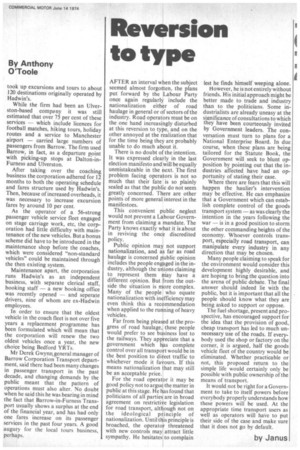Reversion to type
Page 49

If you've noticed an error in this article please click here to report it so we can fix it.
AFTER an interval when the subject seemed almost forgotten, the plans put forward by the Labour Party once again regularly include the nationalization either of road haulage in general or of sectors of the industry. Road operators must be on the one hand increasingly disturbed at this reversion to type, and on the other annoyed at the realization that for the time being they are probably unable to do much about it.
There is no doubt of the intention. It was expressed clearly in the last election manifesto and will be equally unmistakeable in the next. The first problem facing operators is not so much that their fate is so plainly sealed as that the public do not seem greatly concerned. There are other points of more general interest in the manifestoes.
This convenient public neglect would not prevent a Labour Government from claiming a mandate. The Party knows exactly what it is about in reviving the onediscredited policy.
Public opinion ma not support nationalization, and a far as road haulage is concerned ublic opinion includes the people eng: ged in the industry, although the u ions claiming to represent them 'ay have a different opinion. But rom the outside the situation is ore complex. Many of the people who equate nationalization with in fficiency may even think this a rec mmendation when applied to the ru fling of heavy vehicles.
Far from being pleas -d at the progress of road haulage, these people would prefer to see b siness lost to the railways. They app eciate that a government which s complete control over all transpo t would be in the best position to di ect traffic to whichever mode it fa ours. If this means nationalization hat may still be an acceptable price.
For the road operat r it may be good policy not to argu the matter in public at this stage. He as found that politicians of all partie are in broad agreement on restricti e legislation for road transport, alt ough not on the ideological p inciple of nationalization. Until t is principle is broached, the operato threatened with new controls may attract little sympathy. He hesitates to complain lest he finds himself weeping alone.
However, he is not entirely without friends. His initial approach might be better made to trade and industry than to the politicians. Some industrialists are already uneasy at the significance of consultations to which they have been courteously invited by Government leaders. The conversation must turn to plans for a National Enterprise Board. In due course, when these plans are being tailored for the Statute Book, the Government will seek to blunt opposition by pointing out that the industries affected have had an opportunity of stating their case.
Where there are fears that this will happen the haulier's intervention may be effective. He can emphasize that a Government which can establish complete control of the goods transport system — as was clearly the intention in the years following the war — is in a good position to storm the other commanding heights of the economy. Whoever controls transport, especially road transport, can manipulate every industry in any direction that may be chosen.
Many people claiming to speak for the environment would consider this development highly desirable, and are hoping to bring the question into the arena of public debate. The final answer should indeed lie with the public, but it is important that all the people should know what they are being asked to support or oppose.
The fuel shortage, present and prospective, has encouraged support for the idea that the provision of good, cheap transport has led to much unnecessary use of the roads. If everybody used the shop or factory on the corner, it is argued, half the goods vehicle fleet of the country would be eliminated. Whether practicable or not, this proposed return to the simple life would certainly only be possible with public ownership of the means of transport.
It would not be right for a Government to take to itself powers before everybody properly understands how these powers will be used. At the appropriate time transport users as well as operators will have to put their side of the case and make sure that it does not go by default.
by Janus




























































































































